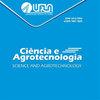Stocking density of red tilapia (Oreochromis sp.) reared in a commercial biofloc system in Colombia
IF 0.9
4区 农林科学
Q2 AGRICULTURE, MULTIDISCIPLINARY
引用次数: 0
Abstract
ABSTRACT Biofloc technology (BFT) has several advantages, such as low water supply requirements and apparent feed conversion ratio (FCR), and high densities. However, there is no information on adequate densities and their effect on the large-scale production of different species. In this study, we determined the effects of the stocking density of monosex red tilapia reared using BFT on the growth performance, water quality parameters, and chemical characteristics of fish on a large scale and under culture conditions in eastern Colombia. In total, six circular tanks (diameter: 14 m, height: 1 m, and capacity: 153 m³) were used in this investigation. Two stocking densities were considered: treatment 1 (T30: 30 fish/m³) and treatment 2 (T40: 40 fish/m³), in triplicate. The water quality parameters of the two treatment densities were within the normal ranges for the species, but dissolved oxygen decreased throughout the production process. The T30 and T40 treatments did not result in significant differences in growth performance. At the end of the trial, the FCRs were 1.6 and 1.7 from T30 and T40, respectively. Fishes raised at a lower density had a similar weight gain; however, their final biomass was not significantly different. BFT did not affect the nutritional characteristics of fish; the percentage of protein (%) in tilapia was 17.81% ±1% and 16.72% ±1% in the T30 and T40 groups, respectively. None of the fish were infected by Salmonella spp. or Vibrio cholerae.哥伦比亚商业生物群落系统养殖红罗非鱼的放养密度
生物絮团技术(BFT)具有供水要求低、表观饲料转化率(FCR)低、养殖密度高等优点。但是,没有关于适当密度及其对不同物种大规模生产的影响的资料。在本研究中,我们研究了在哥伦比亚东部大规模养殖和养殖条件下,BFT养殖的单性红罗非鱼放养密度对鱼的生长性能、水质参数和化学特性的影响。本次调查共使用了6个圆形储罐(直径:14米,高度:1米,容量:153立方米)。考虑了两种放养密度:处理1 (T30: 30只鱼/m³)和处理2 (T40: 40只鱼/m³),共三次。两种处理密度的水质参数均在正常范围内,但溶解氧在整个生产过程中呈下降趋势。T30和T40处理在生长性能上没有显著差异。试验结束时,T30和T40的fcr分别为1.6和1.7。在较低密度下饲养的鱼也有类似的体重增加;但最终生物量差异不显著。BFT对鱼的营养特性没有影响;T30和T40组罗非鱼蛋白质含量分别为17.81%±1%和16.72%±1%。所有鱼均未感染沙门氏菌或霍乱弧菌。
本文章由计算机程序翻译,如有差异,请以英文原文为准。
求助全文
约1分钟内获得全文
求助全文
来源期刊

Ciencia E Agrotecnologia
农林科学-农业综合
CiteScore
2.30
自引率
9.10%
发文量
19
审稿时长
6-12 weeks
期刊介绍:
A Ciência e Agrotecnologia, editada a cada 2 meses pela Editora da Universidade Federal de Lavras (UFLA), publica artigos científicos de interesse agropecuário elaborados por membros da comunidade científica nacional e internacional.
A revista é distribuída em âmbito nacional e internacional para bibliotecas de Faculdades, Universidades e Instituições de Pesquisa.
 求助内容:
求助内容: 应助结果提醒方式:
应助结果提醒方式:


